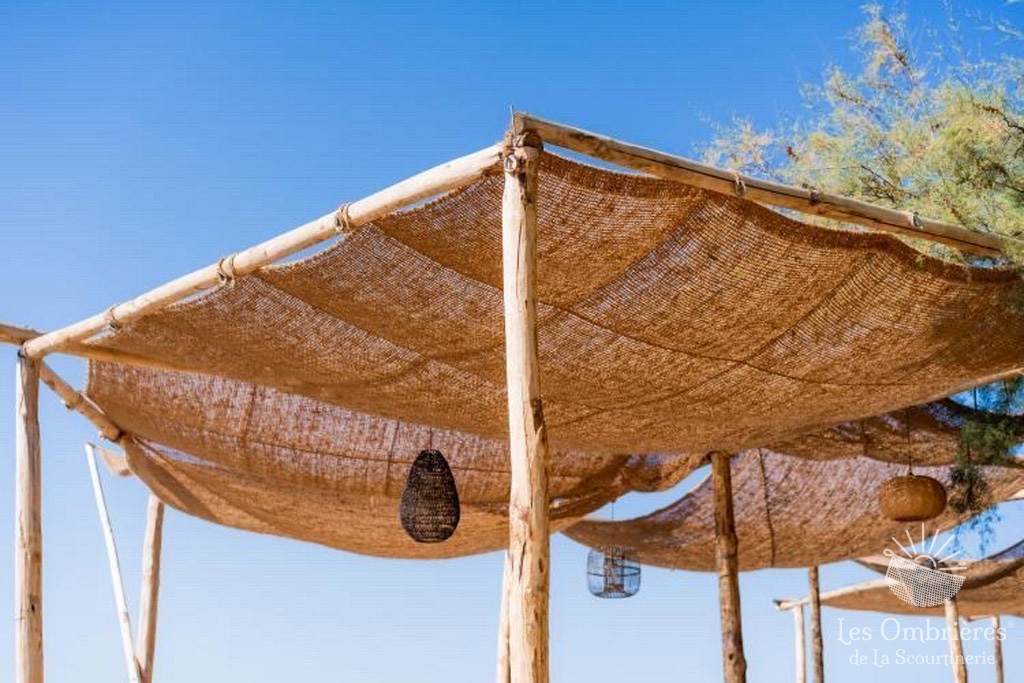The Incredible Advantage of Coconut Fiber for Your Shade Sail
La coconut fiber is a natural material that is gaining more and more ground in various sectors, including decoration, architecture, and gardening. It is distinguished by its numerous environmental and practical advantages.
Coconut fiber: what is it?
Coconut fiber comes from the coconut shell, a tropical fruit widely used in the food industry. It is renowned for its durability, wear resistance, and biodegradability, making it an eco-friendly choice for many products, including shade sails.
The advantages of coconut fiber
- Durability : coconut fiber is known for its weather resistance and its natural rot resistance. These characteristics make it an ideal material for outdoor use, such as for shade sails.
- Environmental respect : coconut fiber is a renewable and biodegradable material. Its use thus helps reduce the environmental impact associated with the production of synthetic materials.
- Aesthetic : coconut fiber offers a natural aesthetic that can perfectly complement your outdoor space. Its natural color and unique texture add a touch of rustic charm.
Coconut fiber shade sail: an innovative solution for creating shade
A shade sail is a piece of fabric stretched between several anchor points, used to protect an outdoor area from the sun. It can be stretched between multiple points (rectangular shade sail or triangular shade sail), or as a solution to cover a pergola. Coconut fiber shade sails offer an eco-friendly alternative to traditional options, while adding a touch of natural charm to your outdoor space.
Why choose a coconut fiber shade sail?
- Solar protection : coconut fiber provides excellent protection against harmful UV rays, while allowing soft and natural light to filter through.
- Natural ventilation : the texture of the coconut fiber allows for natural air circulation, thereby reducing the heat under the sail.
- Durability and strength: being rot-resistant and open-weave, the shade sail withstands weather and strong winds.
- Washable: with a little mild soap and water, quite simply…
- Aesthetic : the coconut fiber shade sail adds a touch of rustic charm to your outdoor space, while blending with various styles of decor.
- Installation freedom: it is possible to assemble multiple sails to cover spaces with unusual shapes. It is also possible to make custom shade sails.

The disadvantages of coconut fiber shade sails?
There aren’t many drawbacks, but rather constraints such as:
- Its weight: a coconut shade sail can weigh between 1.2kg to 2.6kg per square meter if it is wet (in the rain). This requires using reinforcements and a solid attachment system.
- Its natural tint: during installation, it is advisable to rinse it with water so that its natural tint does not stain your terrace.
- It is flammable : avoid placing a coconut shade sail over a barbecue or a plancha. Note that this is valid for all materials like PVC, textile, reed, wood…
- It lets the rain through. But who really wants to stay outside when it rains? This disadvantage is an advantage when it is very hot: the shade is soft and breathable, like under the shelter of a tree (note that there are “high-density” shades for more pronounced shade).
- The envious: it often makes your guests envious… (this is a joke ;-))
How to use coconut fiber in your garden?
Using coconut fiber in your garden is an excellent way to contribute to a more ecological environment.
- Shade sails : you can install a coconut fiber shade sail to create a pleasant shaded area in your garden or on your terrace. It’s an ideal solution for protecting your outdoor space from the sun while respecting the environment.
- Planters : coconut fiber is also used for making planters. These are lightweight, durable, and allow good aeration for plant roots.
- Garden rugs : you can also use coconut fiber to create garden rugs. These are not only aesthetic, but they also help retain soil moisture, which can benefit your plants.
The impact of coconut fiber on the environment
The use of coconut fiber has a positive impact on the environment. As a natural and biodegradable material, it helps reduce waste production. Moreover, coconut cultivation is generally more environmentally friendly than some other plants used for natural fiber production.
- Reduction of carbon footprint : by choosing natural, bio-based, and sustainable materials like coconut fiber, you can reduce your carbon footprint. The fiber is extracted from the coconut, which is often a waste product of the agri-food industry.
- Biodegradability : once its useful life is finished, coconut fiber returns to the earth without polluting the environment (which is not the case for PVC fabrics, for example).
- Responsible industry : using coconut fiber helps support a responsible industry that values natural resources and respects the environment.
In conclusion, coconut fiber is an ecological and durable material that offers many advantages. Whether for a shade sail, a planter, or a garden rug, it is an ideal solution for creating an environmentally friendly and aesthetically pleasing outdoor space.
